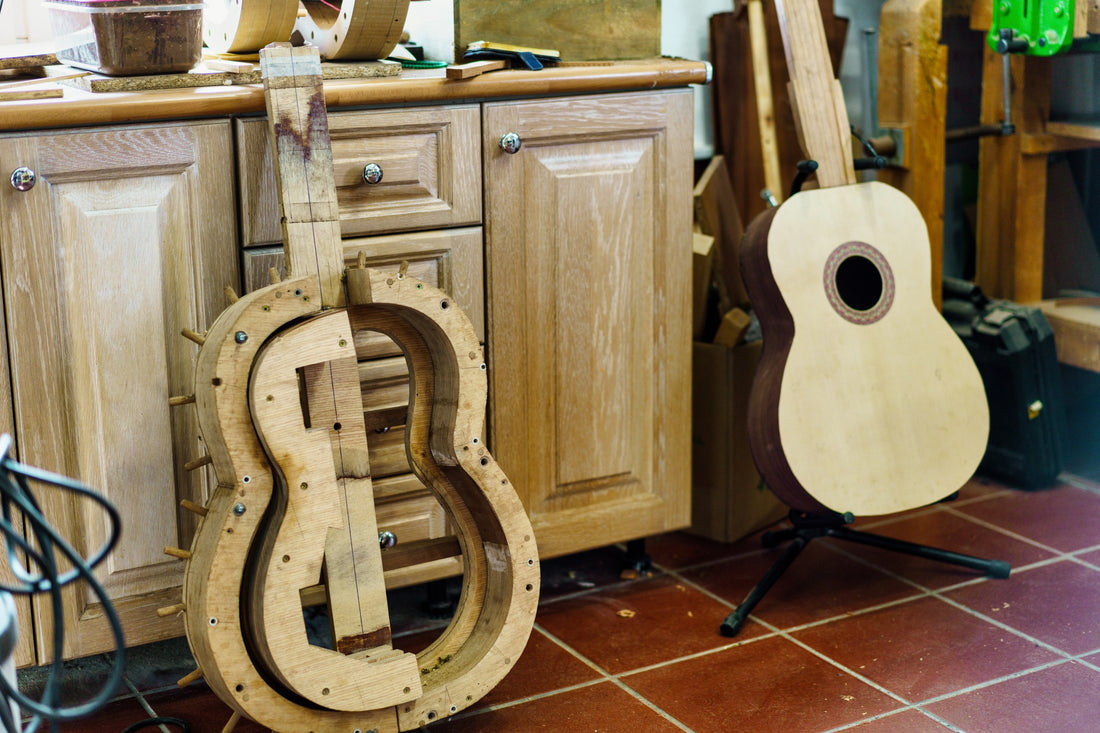There's an almost mystical allure to the guitar. From its curvaceous body to the beautiful sound it emits, the guitar is not just a musical instrument but a piece of art. Yet, there's an even deeper satisfaction – one that stems from crafting the instrument with your own hands.
Imagine selecting the wood, shaping its body, fitting the neck, and finally stringing it, all by yourself. Guitar-building workshops make this dream come true. But beyond the joy of creation, these workshops underscore a crucial lesson: hands-on learning is indispensable, especially when crafting musical instruments. Let’s dive into why this practical approach to learning is so invaluable.
The Kinesthetic Experience
The first and foremost reason is grounded in the philosophy of kinesthetic learning. Some of us absorb knowledge best through reading or listening, but many need the tactile experience – the touch, the feel, the hands-on engagement. When you shape the body of the guitar or sand its edges, your fingers learn the subtleties that no book or video can teach.
Every curve and contour of the guitar has a story, and by physically engaging with these elements, you become a part of that narrative. A hands-on approach engrains knowledge deeper into our memory. Mistakes made, adjustments done, and the triumph of getting it right are all locked in through physical experience.
The Nuances of Wood and Material
Different woods resonate differently. Mahogany, cedar, spruce, or rosewood – each has its unique character. Understanding these distinctions is pivotal in crafting a guitar that sounds just right. Now, reading about the resonant quality of spruce or the warmth of mahogany is one thing, but feeling it, hearing it, and working with it offers insights that are incomparable.
During guitar-building workshops, participants select their materials. They feel the weight, tap to hear the resonance, and witness the transformation from a mere block of wood to a musical marvel. This hands-on experience brings a genuine appreciation for the materials and their influence on the final product.
Precision and Craftsmanship
Building a guitar isn't just about assembling parts; it's about craftsmanship. The bridge's placement, the fretboard's alignment, or the neck's angle, all dictate the instrument’s playability and sound. Workshops teach the art of precision.
There’s a revelatory moment for many when they realize that a slight misalignment can drastically alter the sound. And it's this realization, born out of hands-on experimentation and guidance, that forms the foundation for meticulous craftsmanship.
The Emotional Connect
Imagine the first strum on a guitar you’ve built. The resonance isn’t just in the sound but deep within your heart. A hands-on workshop allows you to imbue your emotions your soul into the instrument. It’s not just about the technicalities; it's about the heart. Every scrape, every chisel mark, every tune is a testament to your journey.
Participants often find that the guitars they build have a deeper emotional resonance than any store-bought instrument. The instrument becomes an extension of themselves, encapsulating the time, effort, and emotion they've poured into its creation.
Confidence and Skill Acquisition
Building a guitar in a workshop setting instills confidence. For many, it might be their first foray into woodworking or instrument creation. To see a tangible, beautiful, and functional outcome at the end is an immense confidence booster.
The skills learned in such a workshop are often transferable. Precision, patience, understanding materials, and tools are all valuable skills, useful in myriad scenarios beyond the workshop.
Customization and Creativity
Building a guitar from scratch allows for an unparalleled level of customization. While commercial guitars might cater to a broader audience, making your own gives you the freedom to tailor its specifications exactly to your preferences. This customization process becomes more intuitive with hands-on learning. Participants can physically test and adjust the instrument at each stage, ensuring the final product is truly unique and in line with their vision.
Problem-Solving in Real-Time
Mistakes are inevitable in any crafting process. However, in a workshop environment, these mistakes aren’t setbacks; they're learning opportunities. Participants learn to troubleshoot in real-time, fostering resilience and adaptability. The tactile nature of these workshops allows for immediate feedback, so learners can correct and refine their techniques on the spot.
Team Collaboration and Peer Feedback
While guitar building might seem like an individual endeavor, workshops often foster a sense of community. Collaborating with peers, sharing insights, and giving and receiving feedback are crucial components of the learning process. Engaging with others hands-on provides diverse perspectives and solutions that one might not have considered when working alone.
Enhancing Sensory Awareness
Our hands are incredible sensory tools, equipped to detect minute differences in texture, temperature, and pressure. As participants engage with various materials, they develop a heightened sense of touch. This heightened awareness can lead to better decision-making in the crafting process, such as discerning the quality of wood or determining the right tension in the strings.
Sustainability and Value Appreciation
In the era of mass production, there's a growing trend toward valuing handcrafted items. By engaging in the guitar-building process firsthand, participants gain a profound appreciation for the time, effort, and resources that go into creating a single instrument. This understanding can lead to more sustainable choices in the future, such as sourcing ethical materials or repairing rather than discarding items.
Therapeutic Benefits
There’s a meditative quality to hands-on crafting. The focus and concentration required can have therapeutic effects, reducing stress and promoting mental well-being. The rhythmic processes, like sanding down the guitar's body or tuning its strings, can be immensely calming. It’s a blend of artistry and mindfulness, with the bonus of producing a functional piece of art at the end.
Closing Thoughts
In an age where everything is increasingly virtual and digital, hands-on workshops like guitar building stand as a testament to the invaluable nature of tactile, real-world learning. They are not just about creating an instrument; they're about forging a connection, understanding nuances, appreciating materials, and imbibing skills that last a lifetime.
So, if you’ve ever felt the itch not just to play a guitar but to create one, consider enrolling in a guitar building workshop. It’s more than just a class; it’s an experience, a journey that underscores why hands-on learning remains timeless and essential.

